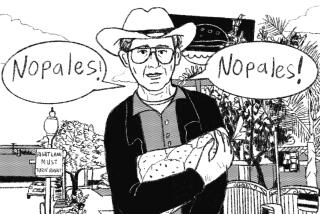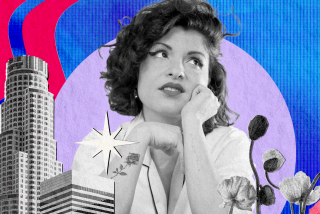Op-Ed: Linda Ronstadt’s ‘Canciones de mi Padre’ changed my life, and my culture
Whenever I hear the opening of Linda Ronstadt’s “La Charreada” I think back to the winter of 1987, when I was 8 years old. That’s when my mom bought Ronstadt’s latest release: “Canciones de mi Padre” (“Songs of My Father”), a Spanish-language cover album that remains a milestone of American music and Mexican American history. A rush of brash mariachi strings, and male yelps that mimic the excitement of a Mexican-style rodeo, followed by Ronstadt’s mighty voice that holds a note for seconds before she launches into rapid-fire verses — and it all comes to me again.
Its national success — it sold over 2.5 million units, the biggest-selling foreign-language album ever in the United States — was a crucial moment to my peers and me. Our generation would become the first group of Mexican Americans to grow up comfortable with both sides of that term. Seeing Ronstadt sing in Spanish on national television, her album cover published in newspapers, taught us that it was OK to be unapologetically Mexican, no matter how assimilated we may be. Any time you hear one of us say “Doyers,” or wear a splendid guayabera, it’s because of her.
“Canciones” was the coda to a banner year for Mexicans in popular entertainment. “La Bamba” and “Born in East L.A.” told stories of the Los Angeles Chicano experience on the big screen. The Los Lobos-fronted soundtrack to the former had played across the Southland that summer. (My dad bought our cassette from a street vendor in front of a King Taco.)
Previous generations of American entertainment giants downplayed their ethnic heritage to appeal to as wide an audience as possible.
Ronstadt was the biggest deal of them all. She had used Español before in her career: a Latin American version of “Blue Bayou,” her own composition, on the 1976 LP “Hasten Down the Wind,” and a duet with salsa legend Rubén Blades in 1985. But with “Canciones” she did something revolutionary. Previous generations of American entertainment giants downplayed their ethnic heritage to appeal to as wide an audience as possible. Now came Ronstadt, deep into her career, with a bold announcement: I’m Mexican, and what of it?
The album isn’t perfect. In “La Charreada,” you can tell Ronstadt’s primary language isn’t Spanish because she pronounces words too exactly and doesn’t elide like a native speaker. Sometimes, she offers despair when the right tone for a song is melancholy, subtle differences that Mexicans raised on mariachi noted then and now.
But 30 years later, “Canciones” remains a classic. It’s an education, as songs span genres from huapangos to sones huastecos, corridos to rancheras, feminine confessions to macho boasts. The three mariachis that backed Ronstadt — Mariachi Vargas de Tecatitlán, Los Camperos de Nati Cano and Mariachi Sol de México —remain the most prominent in the world and ensured that every song sparkled. Ronstadt’s mastery was such that standards such as “Y Ándale” (“Get on With It”) became permanently associated with her.
Critics at the time couldn’t understand the album. Multiple interviewers asked Ronstadt if it was a cheap ploy to capitalize on her distant heritage at a time when “Hispanics” were hot. Rolling Stone dismissed “Canciones” as “the party-gag album of the year,” and complained that the cover art “makes her look like an El Torrito [sic] waitress who’s been nibbling at the guacamole.” (The Times, to its credit, praised the “purity of spirit” in her efforts.)
Ronstadt was unapologetic. “I wanted [fans] to know,” she told a newspaper in 2008, “that they had something that really was strong and it was pure Mexican and that they should feel proud of that and they don’t have to sell [their culture] down the river.”
To promote the album, Ronstadt appeared in all tiers of American pop life: the hip (“Saturday Night Live,” where she performed two tracks with Mariachi Vargas), the august (PBS’ “Great Performances,” for which she recorded a special), and the muy mainstream “Today” and “Good Morning America.” Her best performance was on “Sesame Street,” where she sang “La Charreada” in English to Elmo backed by a Muppet mariachi that nailed it. That appearance, in particular, stuck with me: Nothing normalized seemingly foreign concepts in the 1980s more than “Sesame Street,” so seeing a Mexican on it taught my child’s mind that we were really, truly cool.
“Canciones” won a Grammy for best Mexican American performance in 1989, and an Emmy for the PBS special. But the album did much more than help Ronstadt’s career, or my sense of place.
She was there in 1990 when Mariachi USA hit the Hollywood Bowl for the first time; every summer since, the largest such festival in the U.S. has drawn crowds to the most L.A. of concert venues. Ronstadt “revive[d] the mariachi tradition for both old and new audiences,” wrote UCLA musicology professor Steven Loza in his 1993 book, “Barrio Rhythm: Mexican American Music in Los Angeles.” She also “brought to [mariachi] an even larger, international level of commercial recognition and diffusion.”
My mom still has Ronstadt’s CD, although she now listens to songs on her iPad. It doesn’t matter: The chills that “La Charreada” and the other tracks create remain the same. So gracias, Linda, for showing the world mexicanidad at its best. Now, can you hook me up with an original vinyl?
Gustavo Arellano is the author of “Taco USA” and is a longstanding contributor to Opinion.
Follow the Opinion section on Twitter @latimesopinion or Facebook
More to Read
A cure for the common opinion
Get thought-provoking perspectives with our weekly newsletter.
You may occasionally receive promotional content from the Los Angeles Times.







